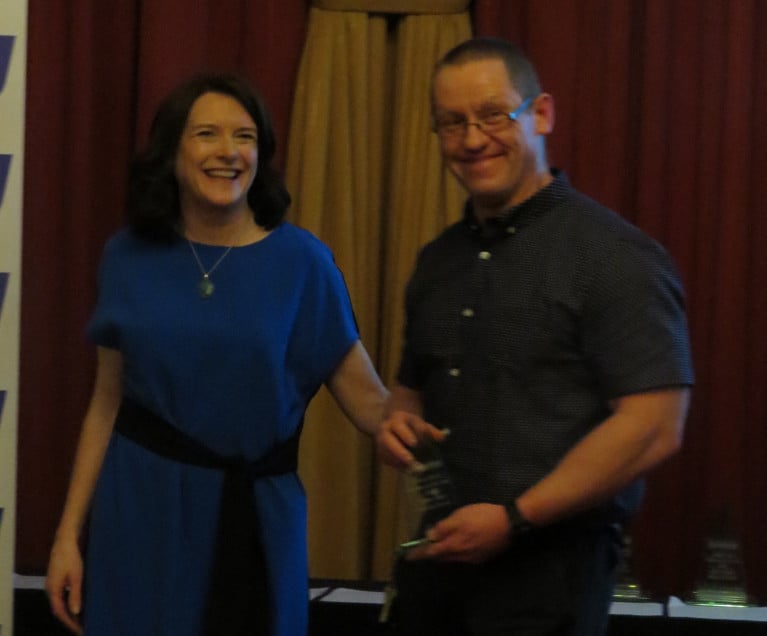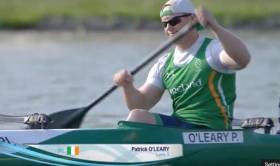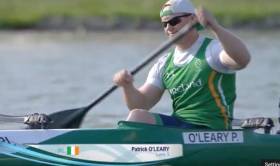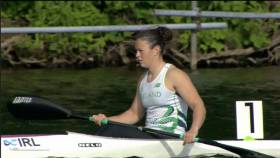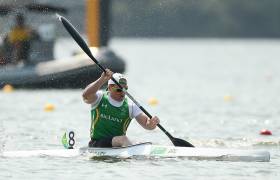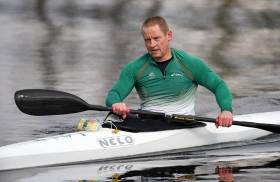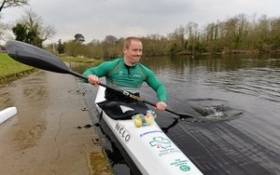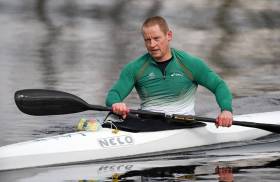Displaying items by tag: Patrick O'Leary
Two-Time Paralympian Patrick O'Leary Announces Retirement
Two-time Paralympian Patrick O’Leary has announced his retirement from Para Canoeing.
Patrick was, for his entire career, a fantastic ambassador for the sport, including representing Para Canoe and Ireland on the ICF Athletes Committee. Having had a series of top results across his career, including his 5th place, finish at the Tokyo Paralympics, 6th place in the Rio Games, and becoming European Champion in 2021, Patrick has made his mark on the sport.
Commenting on his retirement, Patrick spoke about the privilege it has been to pursue the highest honours in sport, and his aim to have his mark on the sport is as much about his reputation as a human being, as well as his results. ‘People won’t necessarily remember your achievements or results, they may even forget your name, but they will remember your reputation and the way you made them feel.’
Canoe Awards Gala Honours Stars and Long-Time Mentor
The Canoeing Ireland Awards Gala on Saturday night, which marked achievements in the sport in 2019, had plenty to celebrate. Liam Jegou, who will represent Ireland in canoe slalom at the Tokyo Olympics and Robert Hendrick, who qualified the boat, were both honoured.
Paralympian Patrick O’Leary, who also qualfied for Tokyo, was presented with his award by Miriam Malone, the chief executive of Paralympics Ireland. Malone and Karen Coventry of Special Olympics Ireland were keynote speakers at the event in the Spa Hotel.
The roll of honour on the night was long: Jenny Egan was chosen as best senior female paddler of the year in both canoe marathon and canoe sprint; Peter Egan was the chosen senior male in marathon canoeing. The senior Freestyle winners were Aoife Hanrahan and David McClure; Aisling Griffin and Michael Barry took the honours in the Paddle Surf category; Ciara Gurhy and Oisin McKay took the Canoe Polo honours. In the Wild Water category Odhran McNally (kayak) and Darragh Clarke (canoe) were honoured.
Oisin Feery, who starred for Ireland at the Special Olympics World Games in Abu Dhabi, won the Special Achievement award; the Event of the Year was Meelick Riverfest; the Team of the Year, the Ireland under-21 women’s Canoe Polo team. The Community Impact prize went to McMahon Cup.
The Volunteer of the Year award went to a man behind many of the medals won by Ireland in Canoe Marathon and Canoe Sprint, the indefatigable Tom Egan.
O'Leary Fourth at Test Event in Tokyo
#Canoeing: Ireland paracanoeist Patrick O’Leary finished fourth in the final of the va’a (VL3 single) at the canoe sprint Test Event at the Sea Forest Waterway in Tokyo. The Corkman has qualified this boat for the Paralympic Games. In the KL3 (kayak) final, O’Leary took seventh.
The venue will hold the sprint canoe and rowing events for the Olypmic Games and Paralympic Games in 2020.
Olympic and Paralympic Test Event, Sea Forest Waterway, Tokyo, Canoe Sprint (Irish interest): KL3 - Final: 7 P O’Leary 46.86. VL3 – A Final: 4 O’Leary 55.623.
#Canoeing: Patrick O’Leary realised his dream of qualifying his boat for his second successive Paralympic Games today. The Ireland canoeist finished fifth in the A Final of the VL3 200 metres at the canoe sprint World Championships in Szeged, Hungary. Curtis McGrath of Australia took the gold. O’Leary, who had won his semi-final, was in fourth or fifth right through a race in which six boats qualified for Tokyo.
Barry Watkins missed out on a chance of qualifying for the Olympic Games in the K1 500. The Irishman took sixth in his semi-final and will compete in a B Final.
Canoe Sprint World Championships, Szeged, Hungary (Irish interest)
Men
K1 500 Semi-Final Three: 6 Ireland (B Watkins) 1:40.38.
Paracanoeing – Men’s VL3 200m A Final (Top six nations qualify for Paralympic Games): 1 Australia (C McGrath) 47.42 seconds; 5 Ireland (P O’Leary) 49.27.
Watkins and Egan Qualify for World Cup Semi-Finals
#Canoeing: Jenny Egan and Barry Watkins qualified for semi-finals at the canoe sprint World Cup in Poznan, Poland. Egan finished fifth in her heat of the K1 200m, while Watkins matched this in the men’s K1 1,000. The paracanoeist Patrick O’Leary reached the final of the VL3 by taking third in his semi-final.
Canoe Sprint World Cup, Poznan, Poland (Irish interest)
Men
K1 1000 – Heat Two: 8 Ronan Foley. Heat Five: 5 Barry Watkins
K1 200m – Heat Two: 5 Ryan O’Connor
Women
K1 200m – Heat Six: 5 Jenny Egan
Paracanoeing: VL3 Men’s 200m – Semi-Final One: 3 Patrick O’Leary. KL3 Semi-Final: 4 O’Leary
Egan Qualifies for World Championships Semi-Final
#Canoeing: Jenny Egan has qualified for the semi-finals of the K1 200 metres at the Canoe Sprint World Championships. The Irish paddler finished seventh in her heat this morning in Racice in the Czech Republic, taking a place as one of the fastest losers. Her semi-final is secheduled for 2.44 Irish time on Saturday.
Ireland’s Patrick O’Leary will compete in the A Final of the KL3 200, part of the Paracanoe World Championships, also in Racice. O’Leary finished third in his semi-final. His final is scheduled for 1.30 Irish time on Saturday.
Sixth Place for O'Leary in Paralympic Canoe Final
#Canoeing: Patrick O’Leary finished sixth in the Final of the KL3 200 metre sprint event at the Paralympic Games in Rio de Janeiro today. The Corkman started quite well, but Ukraine, Germany and Brazil set the pace at the head of the field and took gold, silver and bronze in that order in an extremely close finish - just over a third of a second covered all three. O’Leary was 2.973 seconds off the gold medal and .584 off the bronze. The Irish man placed ahead of competitors from France and New Zealand, who finished seventh and eighth.
Paralympic Games (Canoe Sprint; Irish interest)
Men
KL3 200m - Final: 1 Ukraine 39.810 seconds, 2 Germany 39.909, 3 Brazil 40.199; 6 Ireland (P O’Leary) 42.783.
O'Leary Through to Canoe Final at Paralympic Games
#Canoeing: Patrick O’Leary qualified for the Final at the Paralympic Games today. The Galway-based Corkman finished third in the semi-final of the KL3 200 metres. The top four made it through. Britain’s Rob Oliver and Martin Farineaux of France took the top two places and New Zealand’s Scott Martlew was fourth.
O’Leary, who is an amputee, is coached by Neil Fleming. This is the first time the sport has been part of the Paralympic Games.
Paralympic Games (Canoe Sprint; Irish interest)
Men
KL3 200m - Heat Two (First Two Direct to Final; rest to Semi-Final): 1 Brazil 43.033, 2 Ukraine 45.239; 3 Ireland (P O’Leary) 45.977, 4 New Zealand 46.024, 5 France 46.577. Semi-Final (First Four to Final): 1 Britain 42.852, 2 France 43.572, 3 O’Leary 44.135, 4 New Zealand 44.284; 5 Poland 45.189, 6 Australia 45.258.
Canoeist O'Leary One Place Off Direct Qualification in Rio
#Canoeing: Ireland’s Patrick O’Leary finished third in his heat and will compete in the semi-finals of the KL3 canoe sprint event at the Paralympic Games in Rio de Janeiro. Brazil won, with Ukraine second. The top two qualified directly for the finals: O’Leary was .738 seconds off the second qualifying place.
Paralympic Games (Canoe Sprint; Irish interest)
Men
KL3 Heat Two (First Two Direct to Final; rest to Semi-Final): 1 Brazil 43.033, 2 Ukraine 45.239; 3 Ireland (P O’Leary) 45.977, 4 New Zealand 46.024, 5 France 46.577.
#Canoeing: Patrick O’Leary won his B Final at Paracanoe World Championships in Duisburg this morning, placing 10th overall in KL3 200 and qualifying for the Paralympic Games. The Irishman, who was very close to taking an A Final place, beat Arsen Arsenovic of Serbia and Dylan Littlehales of Australia, who dead heated for second.
Canoe Sprint European Olympic Qualifier, Duisburg, Germany (Selected Results, Irish interest)
Men
K1 1,000 – Final: 1 Hungary (B Dombvári) 3 min 35.307, 2 Russia (R Anoshkin) 3:35.695; 4 M Fitzsimon 3:38.727.
Women
K1 500 – Final: 1 Germany (S Hering) 1 min 55.378, 2 Slovakia (M Kohlová) 1:55.677; 8 J Egan 2:00.270.
Paracanoe World Championships, Duisburg
Men - KL3 200 – B Final (Places 10-18): 1 P O’Leary 42.882 seconds.



























